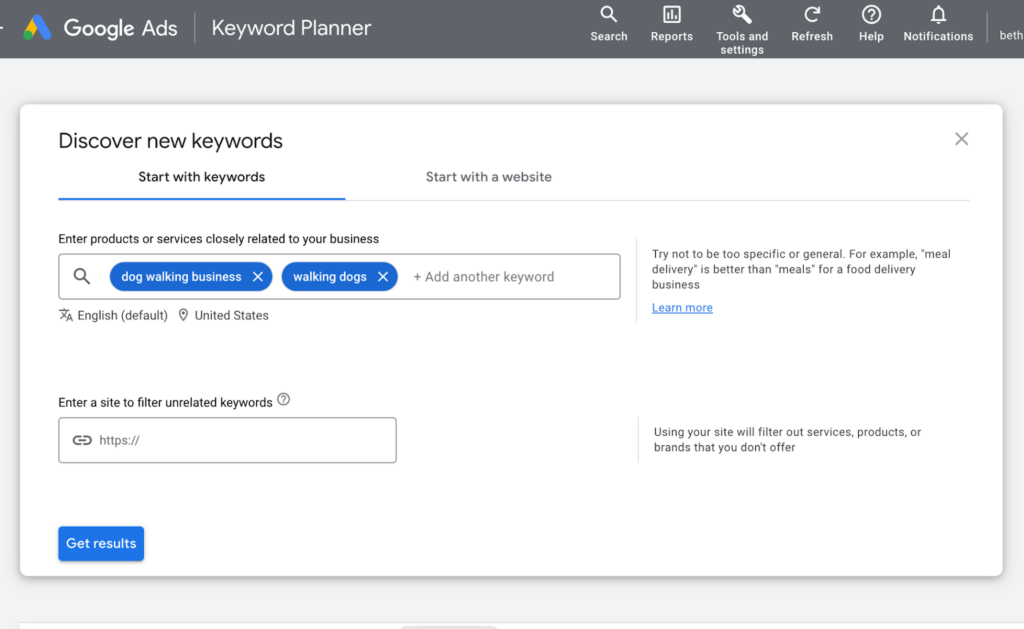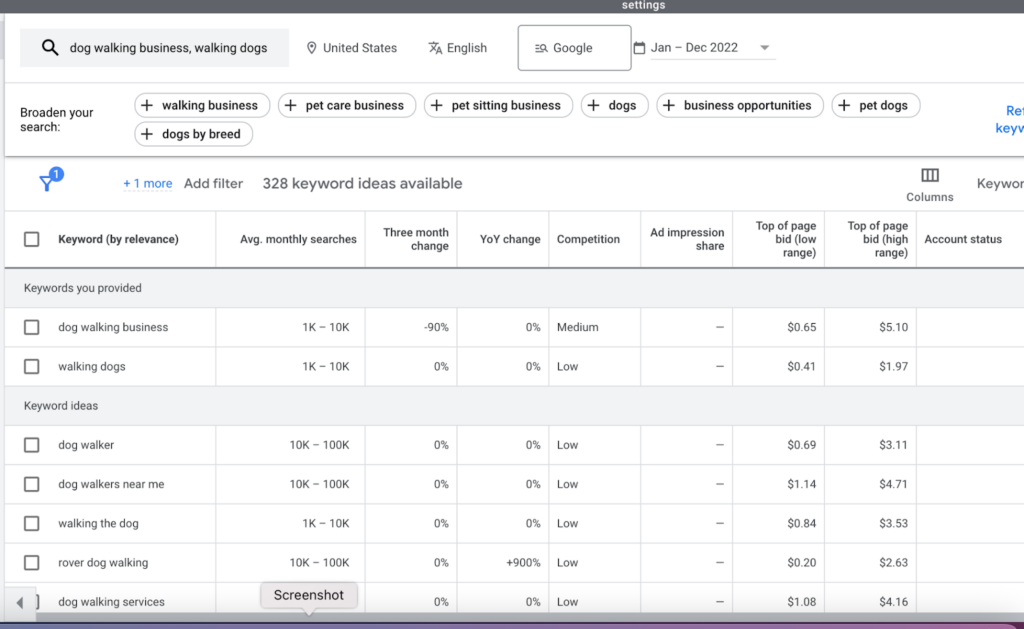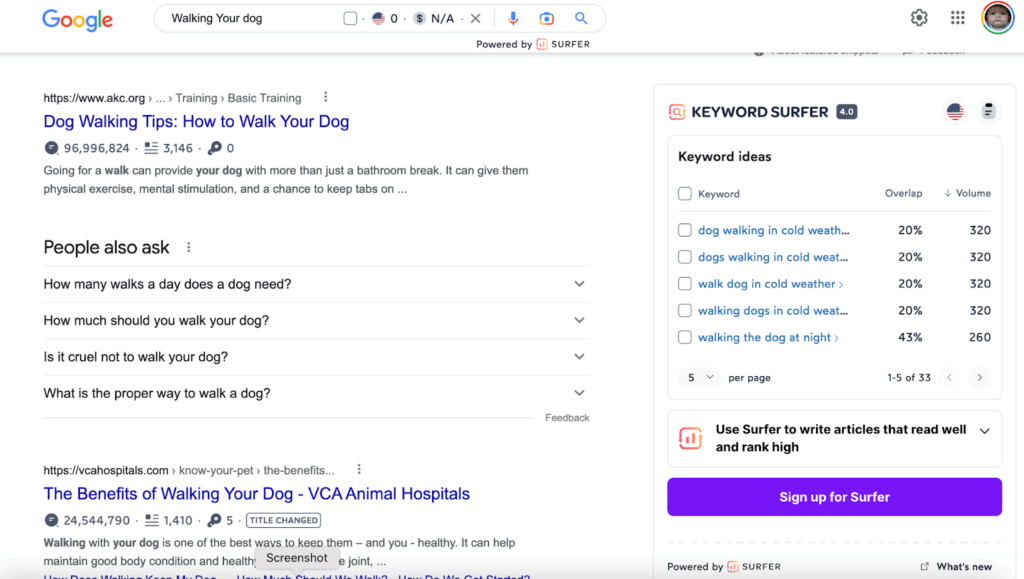The more I write content for Dogwood and Dogwood’s clients, I realize the importance of keyword research in my writing. The blogs I have written that rank highly in search results and get the most clicks are the ones I put time and effort in with keyword research. Today I am sharing my process and exactly how to plan your website content with keyword research.
Oh and none of the tools I am sharing with you today will cost you a single cent to use and they will get the job done!
What is Keyword Research?
Before defining keyword research, let’s learn what a keyword itself is. A keyword is a word or phrase that you input into Google or other search engines to find what you are looking for.
So keyword research is the process of learning what keywords people are searching for.
Why is this important? If you want people to find your website, then you have to know what they are looking for in regard to your content. Once you know what keywords people are searching you can design your content around that so that when they search those terms, they find you! Choosing effective keywords is the starting point for creating great content.
If your keywords are not included in your content, you will not rank for that keyword.
Planning Your Website Content with Keyword Research
You are ready to add content to your web page or blog, what are the first steps?
Decide on a Topic
Obviously, you must first decide on a topic. Think of information that you want and/or need your audience to know. If you have trouble coming up with a topic, consider the following for inspiration:
- Think of how you explain what you do to people you meet face to face
- What questions do you answer for them
- What do you teach them when educating or selling your product
- A problem your business solves
- A topic you share about often that others need to know
Choose one of the above ideas. Now it is time to do your keyword research on the subject.
Tips for Keyword Research
Once I have decided on a general topic for my website content, I then need to learn the best way of phrasing my topic. Just because a phrase or term is common to you in your industry, it does not mean that is how your audience searches for that term. Remember, they may not be familiar with the lingo you use.
Below are some steps you can use for keyword research. I typically use all three in my research before writing so I can get a broad picture. All of these below are free tools you can use!
Free Tools for Keyword Research and How to Use Them
To help you visualize and show you how to understand these tools and the data they give, we are going to pretend we own a dog-walking business and want to create content for our website for it.
Google’s Keyword Planner
Keyword Planner is a free tool from Google to help you research search terms. It is part of their ad manager and although this blog is not about Google Ads, we can use the data for creating our website content.
Begin by inputting your broad search terms. In our fictional dog walking business, I input “Dog walking business” and “walking dogs.” You can put in as many terms that you want in different combinations and I recommend doing so. Then hit “Get Results”

Google then brings up a list of keywords and key phrases that are connected to your terms. These two terms gave me 328 suggested keywords! Since we input “dog walking business” How do you choose a wise one as your content?
There are 3 columns that I like to consider when making my decision: average monthly searches, three-month change, and competition. Below is a screenshot of how it is displayed and then I break down this data and explain why and how I use it.

Average monthly searches: This is the average number of searches for this term within a month. The numbers range from 0-100, 100-1k, 1k-10k, 10k-100k, and so on. Your best bet would be to choose a keyword that is at least 100-1k searches per month or more. If your heart is set on a term that has less search volume it could still prove worthwhile for you if you are in a very niche market and you know that those searching that particular keyword are likely to take action.
Three-Month Change: This data shows you if the search volume stays pretty constant or if it has dramatically increased or decreased. If I see that the search volume has decreased dramatically over the last 3 months, it may not be worthwhile to put time and effort into creating that content. If it has dramatically increased, it could be worthwhile but you must also consider the competition for that keyword listed in the next column.
Competition: This is determined by the ads purchased for this keyword. No, we are not discussing ads here but organic traffic instead but this is something to consider. If competition is low or medium, then my content may really be able to garner search traffic with this keyword. High competition signals that many others are interested in this keyword so I may not gain much organic traffic from my content BUT it could be worthwhile to include content on that keyword on your site for visitors, email marketing (if you email your blog posts) and for sharing on social media. Just because there is high competition and you may not get organic traffic does not mean content on that subject is not worth writing. Just know what to expect from it.
Note that the Google Keyword Planner also gives you an approximate price if you were to run ads for these keywords. This may be something to consider for your website also.
Keyword Surfer – Google Chrome Extension
Keyword Surfer is a free extension that I added to my Google Chrome browser. With this extension, I can google a single keyword or keyphrase and it will show me four important things for each listing:
- The estimated monthly traffic for that listing
- The number of words in that content piece
- The number of exact keywords in that listing
- A sidebar with other keyword ideas
These three things tell me again about how popular this search query (my keyword) is, how long the most popular search results are, and other keywords that could be signaled or included in my content.
It also shows a list of other key phrases that are similar to the one I input. This is great for narrowing down your broad topic even more.
Keyword Surfer is quicker than Google’s Keyword Planner and it shows me the titles of the listings used and not just the keyphrases. If I need to do quick keyword research then Keyword Surfer is the way to go to get a big-picture look at rankings.
Here are the results of inputting “Walking Your Dog” using the keyword surfer extension. I chose this term from the list of keywords from Google’s Keyword Planner.

A Simple Google Search
The final free tool for keyword research that I use is a simple Google search of my topic and/or possible title. Sometimes I even choose to use an incognito search. Why incognito? This removes any cookie influence your computer has on search results and gives you a clearer picture of what search results look like to other people.
When I look at these search results I note what KIND of content is most popular. Are the top results list based? Do they include videography? An infographic? These are all clues to the type of content that your audience prefers and can help you plan your website content accordingly.
A Google search is especially important when you have narrowed down the exact title of your website content. If I chose a title for my blog content that was simply “Walking the Dog” and never googled my own title, I would never know that I am in direct competition with a 1965 song by Rufus Thomas called “Walking the Dog.” Make sure your efforts are worthwhile by doing keyword research when you plan your website content!
Once you have your keyword or key phrase identified, it’s time to craft a title and get to writing what you know!
Dogwood Media Solutions and Planning Your Website Content with Keyword Research
We realize that as a business owner, you may want to plan your website content with keyword research but just may not have the time. We can help. Let us take the time to research and curate quality content for your website or blog. Our services include content curation, search engine optimization, blog writing, keyword research, and much more! We can even help you find the best keywords to create content around and a strategy for writing your own content. Reach out to us today to see how Dogwood Media Solutions can help your business grow!




